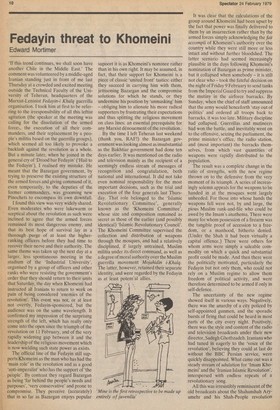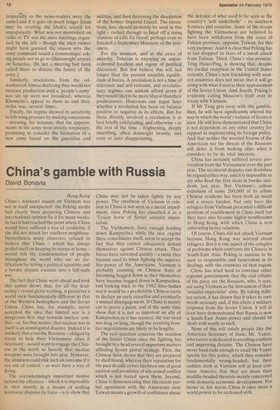Fedayin threat to Khomeini
Edward Mortimer
'If this trend continues, we shall soon have another Chile in the Middle East.' The comment was volunteered by a middle-aged Iranian standing just in front of me last Thursday at a crowded and excited meeting outside the Technical Faculty of the University of Teheran, headquarters of the Marxist-Leninist Fedayin-i Khalq guerrilla organisation. I took him at first to be referring to the irresponsibility of all this leftist agitation (the speaker at the meeting was calling for the dissolution of the armed force.„ the execution of all their commanders, and their replacement by a people's militia based on the guerrilla groups), which seemed all too likely to provoke a backlash against the revolution as a whole. But a minute later, when he joined in the general cry of 'Drood bar Fedayin' ('Hail to the Fedayin'), I realised my mistake. He meant that the Bazargan government, by trying to preserve the existing structure of the armed forces and giving command of it, even temporarily, to the deputies of the former commanders, was grooming new Pinochets to encompass its own downfall.
I found this view was very widely shared. Even moderates who were lukewarm or sceptical about the revolution as such were inclined to agree that the armed forces remained its most dangerous enemy, and that its best hope of survival lay in a thorough purge of at least the higherranking officers before they had time to recover their nerve and their authority. The same theme was taken up the next day at a larger, less spontaneous meeting in the stadium of the 'Industrial University', organised by a group of officers and other ranks who were resisting the government's order that they should return to their units that Saturday, the day when Khomeini had instructed all Iranians to return to work on pain of being considered 'enemies of the revolution'. This event was not, or at least not overtly, Fedayin-sponsored, but the audience was on the same wavelength. It confirmed my impression of the surprising strength of the left, which has really only come into the open since the triumph of the revolution on 11 February, and of the very rapidly widening gap between it and the leadership of the religious movement which is now wielding such state power as exists.
The official line of the Fedayin still supports Khomeini as the man who has had the 'main role' in the revolution and as a good 'anti-imperalist' who has the support of 'the people'. By contrast they regard Bazargan as being 'far behind the people's needs and purposes', 'very conservative' and prone to compromise. They perceive (accurately) that in so far as Bazargan enjoys popular supoort it is as Khomeini's nominee rather than in his own right. It may be assumed, in fact, that their support for Khomeini is a piece of classic 'united front' tastics: either they succeed in carrying him with them, jettisoning Bazargan and the compromise solutions for which he stands, or they undermine his position by 'unmasking' him — obliging him to alienate his more radical supporters by frustrating their expectations and thus splitting the religious movement on class lines: an essential prerequisite for any Marxist denouement of the revolution.
By the time I left Teheran last weekend (thank you, RAF!) the Bazargan government was looking almost as insubstantial as the Bakhtiar government had done ten days earlier. It was mentioned on the radio and television mainly as the recipient of a seemingly endless stream of messages of recognition and congratulation, both national and international. It did not take even nominal responsibility for the most important decisions, such as the trial and execution of the four generals last Thursday. That role belonged to the 'Islamic Revolutionary Committee', generally known as the 'Khomeini Committee', whose size and composition remained as secret as those of the earlier (and possibly identical) 'Islamic Revolutionary Council'. The Khomeini Committee supervised the collection and distribution of weapons through the mosques, and had a relatively disciplined, if largely untrained, Muslim militia under its direct command, as well as a degree of moral authority over the Muslim guerrilla movement Mojahidin i-Khalq. The latter, however, retained their separate identity, and were regarded by the Fedayin as at least potent'al allies. It was clear that the calculations of the group around Khomeini had been upset by the fact that power was finally delivered to them by an insurrection rather than by the armed forces simply acknowledging the fait accompli of Khomeini's authority over the country while they were still more or less intact and without further bloodshed. The latter scenario had seemed increasingly plausible in the days following Khomeini's nomination of Bazargan as prime minister, but it collapsed when somebody — it is still not clear who — took the fateful decision on the night of Friday 9 February to send tanks from the Imperial Guard to try and suppress the mutiny in the airforce barracks. By Sunday, when the chief of staff announced that the army would henceforth 'stay out of politics' and ordered all troops back to barracks, it was too late. Military discipline had collapsed. Guerrillas and mutineers had won the battle, and inevitably went on to the offensive, seizing the parliament, the prime minister's office, the radio station, and (most important) the barracks themselves, from which vast quantities of weapons were rapidly distributed to the population.
The result was a complete change in the ratio of strengths, with the new regime thrown on to the defensive from the very moment of its triumph. A series of increasingly solemn appeals for the weapons to be handed in at the mosques went largely unheeded. For those into whose hands the weapons fell were not, by and large, the pious Muslim rank-and-file who could be awed by the Imam's anathema. There were many for whom possession of a firearm was the tangible proof of accession to a freedom, or a manhood, hitherto denied. (Under the Shah it had been virtually a capital offence.) There were others for whom arms were simply a saleable commodity on which a quick and substantial profit could be made. And then there were the politically motivated, particularly the Fedayin but not only them, who could not rely on a Muslim regime to allow them freedom of political activity, and were therefore determined to be armed if only in self-defence.
The uncertainty of the new regime showed itself in various ways. Negatively, there was the anarchy of a city policed by self-appointed gunmen, and the sporadic bursts of firing that could be heard in most parts of the city every night. Positively, there was the style and content of the radio and television broadcasts under their new director, Sadegh Ghotbzadeh. Iranians who had tuned in eagerly to the 'voice of the revolution', believing they could at last do without the BBC Persian service, were quickly disappointed. What came out was a steady stream of adulation for 'Imam Khomeini' and the 'Iranian Islamic Revolution', interspersed with endless repeats of a revolutionary song.
All this was irresistibly reminiscent of the old broadcasts about the Shahanshah Aryamehr and his Shah-People revolution (especially as the news-readers were the same) and if it goes on much longer Islam may be rivalling the Shah's record for unpopularity. What was not mentioned on radio or TV was the mass meetings organised by the left — though the alert viewer might have guessed the reason why the army command issued a communiqué asking people not to go to Ghalemoghi airport on Saturday. (In fact a meeting had been called there to discuss the future of the army.) Similarly, resolutions from the oilworkers of Ahwaz declaring they would not increase production until a 'people's army' was set up were not broadcast, whereas Khomeini's appeal to them to end their strike was, several times.
Finally, the regime showed its sensitivity to left-wing pressure by making concessions — stressing, for instance, that the appointments in the army were strictly temporary, promising to consider the formation of a new army based on the guerrillas and militias, and then decreeing the dissolution of the former Imperial Guard. The executions, too, should probably be seen in this light — rushed through to head off a rising clamour of calls for blood; perhaps even to forestall a September Massacre of the prisoners.
For the moment, and at the price of anarchy, Teheran is enjoying an unprecedented freedom and vigour of political discussion. But few believe this will last longer than the present unstable equilibrium of forces. A revolution is not a time of tolerance and self-restraint, and revolutionary regimes can seldom afford (even if they would like) to be more liberal thantheir predecessors. Historians can argue later whether a revolution has been on balance positive or negative in its effects. But for those directly involved a revolution is at best briefly exhilarating, and otherwise — or the rest of the time — frightening, deeply unsettling, often downright beastly, and soon or later disappointing.



































 Previous page
Previous page